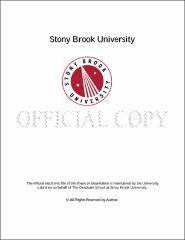| dc.identifier.uri | http://hdl.handle.net/11401/76498 | |
| dc.description.sponsorship | This work is sponsored by the Stony Brook University Graduate School in compliance with the requirements for completion of degree. | en_US |
| dc.format | Monograph | |
| dc.format.medium | Electronic Resource | en_US |
| dc.language.iso | en_US | |
| dc.publisher | The Graduate School, Stony Brook University: Stony Brook, NY. | |
| dc.type | Dissertation | |
| dcterms.abstract | Tyrosine kinases play important roles in cellular communication in animals. c-Src is a nonreceptor tyrosine kinase that is involved in survival, angiogenesis, proliferation, and invasion pathways. There are 9 Src family kinases, and they have a conserved domain arrangement (SH3-SH2-kinase) that is necessary for regulation. The basal activity of c-Src is normally kept low due to phosphorylation by C-terminal Src kinase (Csk). This regulatory relationship has been conserved throughout the evolution of animals. Until recently, it was thought that complex signaling molecules, such as the tyrosine kinases, did not exist outside of multicellular animals. Newly discovered unicellular precursors to mammalian signaling proteins are hypothesized to have played a major role in the transition from unicellular organisms to multicellularity. Homologs of tyrosine kinases have been found in <italic>Capsaspora owczarzaki</italic> and <italic>Ministeria vibrans</italic>, two filasterean unicellular organisms. The genomes of <italic>C. owczarzaki</italic> and <italic>M. vibrans</italic> each contain two Src-like kinases and one Csk kinase. We have cloned, expressed and purified all three proteins in <italic>C. owczarzaki</italic> (CoSrc1, CoSrc2 and CoCsk) and <italic>M. vibrans</italic> (MvSrc1, MvSrc2 and MvCsk) and examined their properties. CoSrc1, CoSrc2, MvSrc1 and MvSrc2 are all active towards synthetic tyrosine kinase substrates, and display different levels of substrate targeting and specificity. Surprisingly, both CoCsk and MvCsk lack activity toward a general tyrosine kinase substrate. Neither Csk phosphorylates or inhibits its respective Src kinase. CoSrc kinases in <italic>Capsaspora</italic> cells are active, consistent with an absence of negative regulation. The tight regulation of Src was an integral step in the development of proper cell-cell interaction in multicellular organisms, and appears to have developed later at the onset of metazoan evolution. We have also carried out preliminary studies aimed at identifying Src substrates in choanoflagellates. One substrate in <italic>M. brevicollis</italic> is the C-terminus of a receptor tyrosine kinase, RTKB2. This RTK contains 6 copies of a unique motif that is phosphorylated by the SFK MbSrc1. Additionally, we studied a homologue of STAT, a transcription factor that is activated by Src in metazoans, from the choanoflagellate <italic>Salpingocea rosetta</italic>. Characterizing more, diverse signaling molecules from unicellular organisms will provide insights into one of the most important events in the evolution of Metazoa: the transition to multicellularity. | |
| dcterms.available | 2017-09-20T16:50:26Z | |
| dcterms.contributor | Miller, Todd | en_US |
| dcterms.contributor | Bowen, Mark | en_US |
| dcterms.contributor | Reich Marshall, Nancy | en_US |
| dcterms.contributor | Boon, Elizabeth | en_US |
| dcterms.contributor | Thomsen, Gerald | en_US |
| dcterms.contributor | El-Maghrabi, Raafat. | en_US |
| dcterms.creator | Schultheiss, Kira | |
| dcterms.dateAccepted | 2017-09-20T16:50:26Z | |
| dcterms.dateSubmitted | 2017-09-20T16:50:26Z | |
| dcterms.description | Department of Molecular and Cellular Biology. | en_US |
| dcterms.extent | 175 pg. | en_US |
| dcterms.format | Monograph | |
| dcterms.format | Application/PDF | en_US |
| dcterms.identifier | http://hdl.handle.net/11401/76498 | |
| dcterms.issued | 2013-12-01 | |
| dcterms.language | en_US | |
| dcterms.provenance | Made available in DSpace on 2017-09-20T16:50:26Z (GMT). No. of bitstreams: 1
Schultheiss_grad.sunysb_0771E_11473.pdf: 6261060 bytes, checksum: ab2cab0a44141f038e0b24cac41bdad9 (MD5)
Previous issue date: 1 | en |
| dcterms.publisher | The Graduate School, Stony Brook University: Stony Brook, NY. | |
| dcterms.subject | Biology | |
| dcterms.title | Lack of Csk-mediated negative regulation in a unicellular Src kinase | |
| dcterms.type | Dissertation | |

